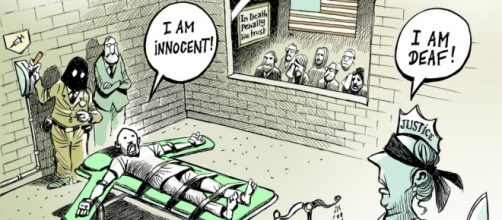Blasting News recently reported on the "assembly line" executions that the Governor of Arkansas Asa Hutchinson was scrambling to conduct before the state's supply of a drug they use for their executions expires. Since the report, the state has come up against opposition from the drug companies that make the drug, the court system and even celebrity-infused activism. Despite this, the state was able to execute Ledell Lee on Thursday for the 1993 murder of Debra Reese who was 26-years-old.
As the article states, the surprising thing about the state's willingness to execute seven inmates in 11 days is not just because of how many inmates the state would execute in such a short amount of time but, the fact that the state had not executed anyone for 12-years.
Originally, the goal was to execute eight inmates but one was stayed followed by others who were scheduled to be executed starting last Monday. The first article referred to by Blasting News goes through the details of a history of controversies with using the execution drugs and what they were actually intended for.
Death row politics
Opinion: The debacle in Arkansas reaffirms that the death penalty is arbitrary, unchecked and unfair https://t.co/I7O8kyuYXr
— Washington Post (@washingtonpost) April 22, 2017
Over the last week, former death row inmate Damien Echols was interviewed on various programs about the Arkansas death row inmates as he claimed to know them from when he was in prison. In one interview with Charlie Rose on April 18, he said that it didn't matter that DNA evidence would finally acquit him because even when they had it, the state still tried to execute him.
In a similar argument in an opinion piece by the Washington Post titled: "The debacle in Arkansas reaffirms that the death penalty is arbitrary, unchecked and unfair." Radley Balko said that the strength of evidence (whether they committed the crime or not) nor the severity of the crime aren't factors that drive the death penalty but rather that it's the politics. He said that the politics of the county where the murder trial takes place, the prosecutor and the state are what drive the death penalty.
He referred to a 2013 report by the Death Penalty Information Center and said that only two percent of counties throughout the U.S. account for the majority of the death row population and that those are the same counties, where there are prosecutorial misconduct and killings by police officers.
He also pointed out the differences in death sentences versus actual executions. This would certainly appear to be the case as it applied to Echols. Quite often it is argued that statesmen who have the power to execute or stay have to look tough on crime and will generally carry out executions, even if the person is innocent. The politics would conclude that any motive leading to an acquittal or that one would pursue it falls on party lines and ideology rather than justice. In other words, it could be considered a liberal agenda.
Conservative stance on executions
Balko's article also takes a sample of some of the text by a conservative commentator named Jonah Goldberg from the National Review who made the argument in support of executions using the "Facebook Killer" Steve Stephens as an example.
Blasting News has reported on Stephens whose run from the law ended last week, who recorded his crime of shooting 74-year-old Robert Godwin on Easter Sunday. The conservative writer said that if Stephens had not killed himself while he was on the run, and had been caught, he would be subjected to what he referred to as "sleight-of-hand rhetoric" by anti-death penalty advocates.
In the section the Washington Post clipped from Goldberg's op-ed, Jonah described Robert Godwin as, "a father of ten and grandfather of 14," in order to play off of the sentiments on his readers. This is common practice by conservatives who make arguments in court or on the floor of a parliamentary setting for why someone should face execution, or to describe other controversial issues when legislating against abortion.
These are positions, however, that are apparently failing to convince many who are against the death penalty today, which is clearly a mindset that is taking hold nationwide as it becomes more unpopular and less of a common practice.

